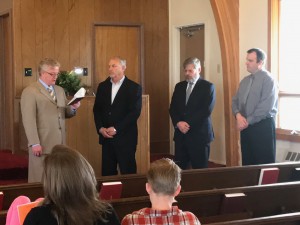1 “Wake, awake, for night is flying,”
the watchmen on the heights are crying;
“awake, Jerusalem, at last!”
Midnight hears the welcome voices,
and at the thrilling cry rejoices:
“Come forth, ye virgins, night is past!
The Bridegroom comes; awake,
your lamps with gladness take; alleluia!
And for his marriage feast prepare,
for you must go to meet him there.”
2 Zion hears the watchmen singing,
and all her heart with joy is springing;
she wakes, she rises from her gloom:
for her Lord comes down all-glorious,
the strong in grace, in truth victorious;
her Star is ris’n, her Light is come!
Ah, come, thou blessed Lord,
O Jesus, Son of God, alleluia!
We follow till the halls we see
where thou hast bid us sup with thee.
3 Now let all the heav’ns adore thee,
and men and angels sing before thee,
with harps and cymbal’s clearest tone;
of one pearl each shining portal,
where we are with the choir immortal
of angels round thy dazzling throne;
nor eye hath seen, nor ear
hath yet attained to hear what there is ours;
but we rejoice, and sing to thee
our hymn of joy eternally.
Wake, Awake, for Night is Flying
Our hymn of the month is #317, “Wake, Awake, for Night is Flying.” This hymn was written (words and music) by Philipp Nicolai, a Lutheran minister, in 1599. Nicolai also wrote “How Lovely Shines the Morning Star,” #515 in the 1990 Trinity Hymnal, and these two hymns became known as the “King and Queen of the Chorales” and both were arranged later by J.S. Bach in the forms we have today. Nicolai is regarded by many as one of the greatest hymn-writers of the Christian faith. These two hymns in particular were written as part of a devotional written to comfort his congregation after a severe bout of the plague, in which 1300 of his parishioners died in one year (1597).
The hymn is a joyful anticipation of the moment when Christ returns to consummate the salvation of His people. It draws from several Biblical figures. In Isaiah 52, the watchmen of Jerusalem call to Jerusalem to awake to see the salvation that God is bringing to them. In Matthew 24, Jesus uses the figure of virgins awaiting the return of the bridegroom for the beginning of the wedding feast, to exhort us to live lives of readiness for His coming. Throughout, the hymn expresses an awareness that the present state falls far short, a night and a gloom that only retreats with the full manifestation of He who is our light.
Verse 1 calls to us, as the people of God, to be ready. It can be read on two levels: one, that we live lives of anticipation, looking forward with joy to the time when our sorrow and troubles are done, when Jesus returns; and two, that we live our lives in the immediate present in the light of the truth that His return may be at any time. The foolish virgins were not ready for the coming of the bridegroom, and had to go get more oil for their lamps, and thus missed out on the feast. The wise virgins were prepared for that return to be imminent, but also prepared for it to be postponed for some time, and thus were ready. Jesus uses this parable to inform us in the attitude we should take to our lives in the present age—ready for an imminent return, but also prepared for a long wait. But even that long wait will be endured in the joyful anticipation of the time we know is coming. The song is infused with a sense of great joy at His coming, a joy that sees God’s people through that long wait.
Verse 2 really emphasizes the truth that our hope and joy is not in the present. Our joy and hope is all in our Savior, and we do not yet have Him fully, and so we are in “gloom,” from which we emerge only truly when He comes. The one who eagerly looks for his joy in this life does not have his mind focused on the Savior, and so the hymn both encourages us to rest in the hope to come, and exhorts us as well to get our eyes off the vain hopes of this world. The speakers in the hymn have their hearts fully fixed on the joy to come, because their hearts are fixed on Christ. If our faith and trust is in Christ, then our hearts must be fixed on the future, for we do not fully enjoy Christ now, He who is “all-glorious, the strong in grace, the truth victorious.” We are united to Christ now and experience many of His gifts, but this can only increase our anticipation of the time when we enjoy Him fully, and even the partial enjoyment of His grace in the present should cause the false and ephemeral attractions of this life fade in comparison. So the hymn, in verse 2, says with the Apostle John, “Come, Lord Jesus.”
Verse 3, informed by the teachings of Scripture, imagines what that moment will be like, when God’s glory is fully revealed in Christ to all His people, and we, together with men and angels and all creation, praise God as He deserves to be praised. The writer knows that we cannot even know what that will be like—“nor eye hath seen, nor ear hath yet attained to hear what there is ours;” but nonetheless, we can rejoice now to know that it will truly be wonderful, the full satisfactions of all our desires and hopes, more than we can even understand in the present.
